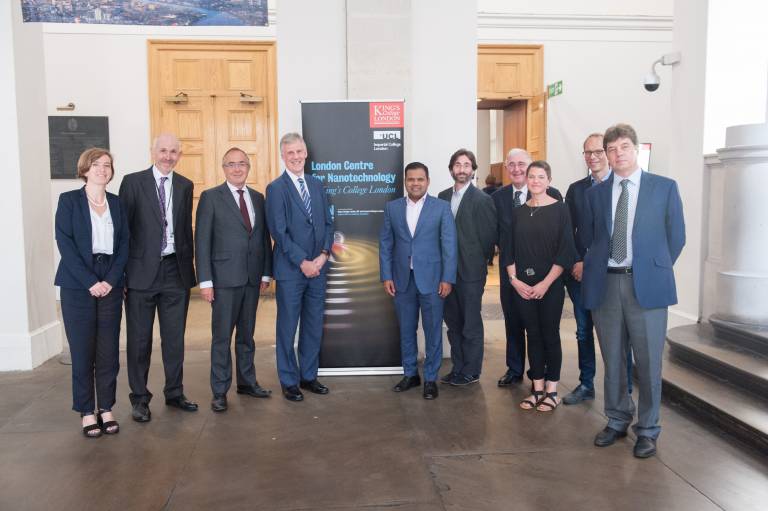King’s College London joins powerhouse of nanotechnology research
5 September 2018
King's College London is joining with the London Centre for Nanotechnology to use the power of nanotechnology to confront global healthcare, energy and environmental challenges.

King's will join two of the capital’s leading universities, UCL and Imperial College London, as partners in the London Centre for Nanotechnology (LCN), a pioneering research centre set up in 2003.
Together the three universities will build on the work the Centre has already done to harness the power of materials a 1000 times smaller than a width of human hair.
Innovations already developed by the Centre include a mobile phone-connected tool that can detect HIV in a fraction of the time it currently takes, and a new generation of systems designed to provide an early-warnings of disease outbreaks.
King’s will bring multi-disciplinary expertise and cutting-edge equipment to the partnership, especially in the areas of high-resolution optical imaging, nanobiology and nanophotonics. Its world-leading scientists will complement UCL and Imperial’s existing expertise across medicine, materials, chemistry, physics, electrical and electronic engineering, and earth sciences.
Their involvement will also increase the opportunities for the development of new areas of research, improve the opportunities for partnership working and accelerate the development of nano-based technologies.
Speaking about the partnership, Professor Anatoly Zayats from the Department of Physics at King’s College London said: ‘We are delighted to be adding the world-leading expertise of King’s College London to the LCN.
‘The combination of facilities and expertise in complimentary fields will allow the LCN to address a range of new challenges, which would not be possible for any one institution.
‘King’s, UCL and Imperial will now be able to plan and develop new facilities and capabilities to promote multidisciplinary research and develop new partnerships with industry.
‘This partnership will help ensure that London continues to set the pace in this incredibly exciting area of research.’
Professor Andrew Fisher, Director of the London Centre for Nanotechnology said: ‘“We were very impressed at the great fit between the facilities, and the research topics being pursued at King’s with those in the LCN. Extending the collaboration across London will bring new opportunities and allow the LCN to have still greater impact.”
Professor Milo Shaffer, co-Director of the London Centre for Nanotechnology, from the Department of Chemistry at Imperial College London ‘We are delighted to welcome King’s to the LCN, expanding the critical mass of researchers, linked together in London.
‘The integration of nanoscience and nanotechnology into complete systems will contribute to many major challenges facing the world, ranging from accelerated computing, to clean energy, safe water, and targeted healthcare.’
Links
- London Centre for Nanotechnology
- Professor Andrew Fisher’s academic profile
- Professor Anatoly Zayats’ academic profile
- Professor Milo Shaffer’s academic profile
Image
From left to right
Professor Sandrine Heutz LCN, Imperial College London
Professor Andrew Fisher, LCN Co‐Director, University College London
Professor Michael Arthur, President and Provost, University College London
Professor Phillip Nelson Executive Chair EPSRC
Rajesh Agrawal Deputy Mayor of London for Business
Professor Milo Shaffer, LCN Co‐Director, Imperial College London
Professor Ed Byrne President and Principal, King’s College London
Professor Maddy Parsons, LCN, King’s College London
Professor Bart Hoogenboom, LCN, University College London
Professor Anatoly Zayats, LCN Co‐Director, King’s College London
(Credit: Nathan Clarke @NClarkephoto)
 Close
Close

